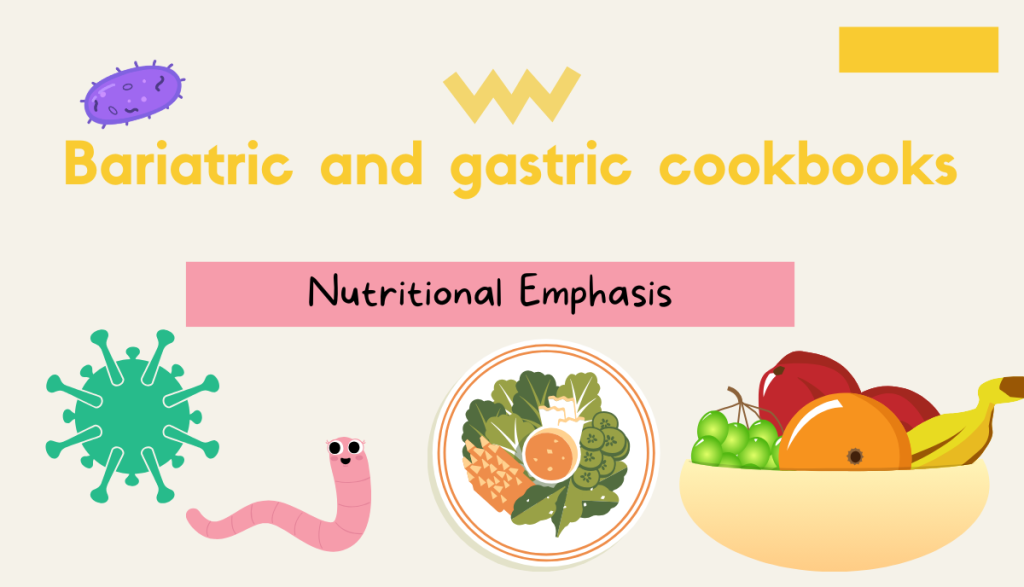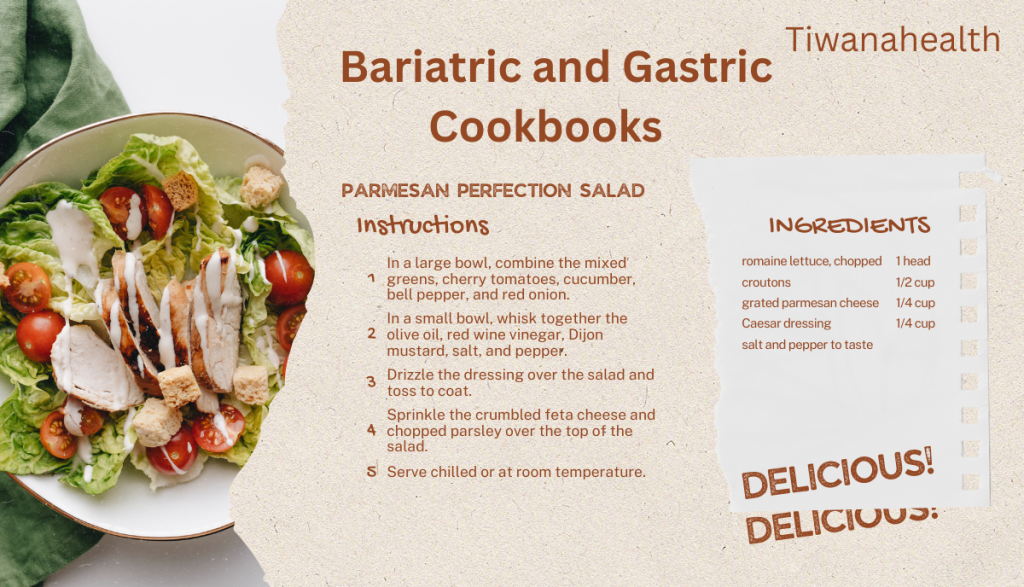Bariatric and gastric cookbooks, Nutritional & Portion control and bestselling
These are bariatric and gastric cookbooks for the patient after weight loss surgery, in particular, gastrectomy bypass or sleeve gastrectomy. Both of these surgeries do so much to alter the stomach and sometimes even the digestive tract that dietary intake must also change in a dramatic manner. Hence, people going through these types of procedures need specialized recipes to adapt to their new ways of eating. These cookbooks provide recipes to eat after surgery, but they also offer advice on how to live healthily and achieve a balanced intake of nutrients. Bariatric and Gastric Cookbooks Explained
Contents
Nutritional Emphasis:
Bariatric and gastric cookbooks are designed to focus on special nutritional needs after bariatric surgery. These recipes place great emphasis on high protein levels, low sugar, and low fat in recipes to help avoid complications such as dumping syndrome, a condition whereby food moves through the small intestine too fast. They also place a great emphasis on portion control, which is an integral part of a diet after surgery, due to the drastic reduction in stomach size.
Nutritional Emphasis in Bariatric and Gastric Cookbooks One finds a very delicate emphasis on nutrition within bariatric and gastric cookbooks, as these are tailored to meet the varied needs of persons who have gone through weight loss surgery. These books target a diet that ensures recuperation and continual weight loss, which avoids symptoms associated with such a surgical process due to the aggressive changes the body undergoes.
High Protein Focus: Protein is the cornerstone of the diet following bariatric surgery. It helps the healing process, continues to maintain muscle mass while the individual is quickly losing weight, and provides long-lasting satiety, which keeps portion sizes under control. Most of the recipes included in bariatric cookbooks are rich in sources of lean protein, like chicken, fish, beans, and low-fat dairy products, so that at every meal they could add their daily required intake of protein. It has low sugar and low-fat recipe books. The reason for this is to prevent dumping syndrome, which is an illness that causes nausea, weakness, excessive sweating, faintness, and diarrhea immediately after eating sugar-rich or high-fat food. With a concentration of meals that are low in simple carbohydrates and bad fats, these cookbooks help keep away from such uncomfortable, even harmful, symptoms associated with the digestion of sugar and fat.

Micronutrient Consideration: Quite often, bariatric surgery potentially reduces the quantity of food intake. Furthermore, it changes digestion and absorption of food through altered transit times. Hence, immense focus falls upon micronutrient-dense foods. Vitamins and minerals like iron, calcium, and B vitamins will be very important; the deficiency of any one of these may lead to serious health problems. Ingredients fortified with or naturally rich in these nutrients are included in recipes to contribute toward the daily requirement.
Portion Control:
Because the stomach is much smaller than usual after surgery, the intake volume becomes drastically reduced. Post-bariatric surgery cookbooks not only provide nutritionally appropriate recipes but also educate on the portion sizes so that there is no overeating that would overstretched stomachs but digestive ease with weight management.
Hydration:
One of the major focal points is adequate hydration through fluids that are not sugared and carbonated. Many cookbooks provide tips on how to make including fluids throughout the day in order to avoid dehydration, a very common condition after surgery due to low capacity to take large volumes at once.
Bariatric and gastric cookbooks are that perfect guide, providing the framework necessary to efficiently work within one’s new nutritional parameters. This personally-based approach helps maximize the benefits of the surgery while minimizing its complications, which makes both short-term recovery and long-term health maintenance easier.
Stages of Eating:
Immediately after surgery, patients go through some stages of diet progressing from just liquids to pureed food, then gradual progression to solid food. Bariatric cookbooks therefore give recipes tailored specifically for each of these phases, thus enabling the patient to progress through each phase safely and easily. As the patient progresses, the recipes become more diversified, adjusting to enhanced capacity to digest more solid food. A specific sequence of dietary progression after bariatric surgery is required so that the new stomach structure heals properly and for patients to adjust to the way they now eat. One can break this process down into several different stages, increasing the textures and eventual food complexity the system should process. These different stages will allow for a smoother recovery and provide for long-term success in managing weight management.
Stage 1: Liquid Diet Duration:
This diet is usually followed for 1-2 weeks after the surgery. Foods Included: The diet at this stage will comprise only liquids, which keep the stomach from getting into strained periods because of solid foods. A liquid diet would include water, broth, unsweetened tea or coffee, electrolyte drinks, etc. Adequate hydration and a minimum amount of energy are provided without irritating the surgical site.
Stage 2 Pureed Foods Duration:
This phase typically lasts between 2-4 weeks. Foods Allowed: As the name suggests, all foods consumed during this phase must be pureed to a smooth consistency. Patients can now introduce pureed richer sources of protein like cottage cheese, lean meats, and beans, along with soft-cooked vegetables and fruits. Foods must be chunk-free to avoid any possibility of blockage or damage to the healing stomach.
Phase 3: Soft Foods Duration:
Lasts about 4-6 weeks after pureed food. Foods Included: This phase includes foods that are soft to chew and swallow, such as cooked and soft vegetables, finely diced or ground lean meat, and very soft fruits like bananas. The texture is somewhat higher than in the pureed stage; however, foods must still be very soft to be easily digested. Patients are frequently cautioned to stay away from fibrous vegetables, nuts and seeds, and tougher meats during this stage.
Stage 4: Solid Foods Duration:
Approximately 8 weeks post surgery, long-term. Permitted Foods: The patient would allow for increased texture in the regular diet at this point and move closer to the very “normal” foods, but the stress still lies towards high protein, low fat, low-sugar foods. Encourage whole foods with lean proteins, vegetables, and fruits, while cautioning against processed foods, sugary snacks, and foods with a high level of fat.
More chewing:
This will better assist in the digestion of food and will also allow the stomach to more effectively hold it to prevent an upset stomach or constipation. Eat slowly and to ideal capacity; make sure to pause frequently while consuming a meal to prevent overeating or experiencing discomfort that may be of some origin, as it is possible for the signals from the altered stomach to take longer to reach the brain to communicate that one is full.
Hydration:
Although patients should be well hydrated, fluid intake during or immediately after a meal should be avoided to prevent filling their reduced stomach capacity with liquids instead of nutrient-rich foods. Each stage is designed to ease patients through the limitations and functions of their new stomach while obtaining adequate nutrition. By going too quickly through these stages, one is at risk of complications and undermining the effectiveness of surgery. Because of this, it will become highly important to follow advice from healthcare providers. These stages, followed diligently, will set the base for a long-term healthy eating pattern that will help support weight management and overall health.
The Role of Cookbooks in Recovery
Educational Tool: Other than being a recipe resource, bariatric and gastric cookbooks become educational tools. In many instances, they include detailed descriptions of the diet one is supposed to follow after surgery, meal planning and preparation tips, and how one should go about reading food labels. This education is very important to enable patients to understand not only what to eat but also why some foods are better than others. Emotional and Psychic Support: Physically and emotionally, adjusting to a new diet is not easy. Cookbooks related to bariatric cookery often approach such challenges by providing techniques on how to cope with eating changes, dealing with cravings, and eating mindfully. In this way, these cookbooks are able to help minimize the overwhelming anxiety bound to occur with such a dramatic change in lifestyle by offering a structured path.
Gastric and bariatric cookbooks are pivotal books in the recovery and lifelong success of patients who partake in weight loss surgery. These specialty cookbooks are not just good-for-you recipe collections; they’re also tools that help a patient navigate the dramatic lifestyle and dietary changes following the procedures.
The bariatric cookbooks have a huge responsibility to inform patients about the specifics of the new dietary needs. This is about not only how many calories it is possible to put inside oneself but also about getting the right amount of nutrients in smaller volumes of food. These cookbooks give phase-specific detailed nutrition information, including which types of foods, textures, and portion sizes are safely digestible, which are very effective at each stage of the recovery.
Nutritional Guidance
The body’s ability to absorb the required nutrients is dramatically altered post weight loss surgery. As in the case of such bariatric cookbooks, they feature recipes of high protein content and excellent sources of vitamins and minerals that provide vital nourishment for recuperation and long-term health in a fashion that is digestible and absorbable under the new gastrointestinal configuration. They increase the emphasis on healthy meal with high protein, low levels of simple carbohydrates, and moderate amounts of fats, thus fitting the nutritional bills to avoid common complications, which occur after surgery, such as dumping syndrome.
Psychological and Emotional Support:
It is psychologically arduous to be introduced to a new way of eating for many patients. Many patients suffer from feelings of deprivation or frustration because of the restricted eating habits. Bariatric cookbooks mediate such feelings with a diversity of flavorful, satisfying recipes that fit within the dietary parameters, making every meal something to look forward to rather than a chore. These cookbooks can truly boost morale and help an individual keep a positive frame of mind in the change in diet and lifestyle by providing creative and tasty options.
their healing process. Explaining why they recommend or advise against eating certain foods helps patients make informed diet decisions. This kind of patient education is critical for preventing complications and easing the transition to new eating habits.
System of Support
Bariatric cookbooks also provide reassurance and act as a support system for people who may find it extremely overwhelming to completely change their dietary intake. Physically and emotionally, transitioning to smaller portion sizes and different food textures can become very hard if not done gradually. These cookbooks represent creative and tasty recipes while under dietary restrictions after surgery, thus reducing boredom and aggravation due to a lack of diet. They demonstrate that the food that is consumed does not have to be mundane and monotonous, which may dramatically improve patient morale and increase compliance with the prescribed diet.
Tool for Long-term Lifestyle Change
Bariatric cookbooks do more than offer ideas for the immediate post-operative period. Keeping the weight off and staying healthy for the rest of a patient’s life after weight loss surgery can only occur with lifelong changes in dietary practices. The recipes contained within both these cookbooks are not only suitable for the recovery period but meant to be helpful as part of a lifelong weight management and health support plan. They educate the patient on how to include high-protein, low-fat, low-sugar meals permanently in the diet, so that the benefits of the surgery are extended long into the future.
Community Connection
What helps in giving a community of understanding is most of the bariatric cookbooks are either written by nutritionists, doctors, or personal people who once suffered from the disease and share their experience and knowledge. On the part of these individuals, it gets very comforting, especially since they might have felt lonely in their experiences. Some even come with testimony or personal stories from other patients giving varied perspectives and shared experiences that one can be motivated or inspired from.
Personalization and Discovery
Bariatric cookbooks allow an easier adjustment period to these new dietary restrictions. This sense of control that the patient feels over their diet can make the overall dining process a lot more enjoyable. Being able to convert recipes slightly and make smart substitutions helps empower patients to handle social scenarios and dine out—a vital step to normalizing lifestyle changes.
Bestselling Bariatric and Gastric Cookbooks

“The Gastric Sleeve Bariatric Cookbook”: This is a book frequently recommended to those recovering from sleeve gastrectomy. It contains an array of recipes to answer all the phases of recovery after bariatric surgery—from liquids right through to solids—to ensure that each meal gives a balance of nutrients.
“Eating Well After Weight Loss Surgery”: This cookbook offers over 140 great recipes to keep patients of weight-loss surgery on the right track with their eating plan post-op. It is highly regarded for delicious recipes that retain excitement and variety in meals that can so often seem limited after bariatric surgery.
Conclusion
By being more than cookbooks, bariatric and gastric cookbooks become intrinsic to the recovery phase of their maintenance program beyond weight loss surgery. They provide the important nutritional guidelines and help needed by people adapting to new eating patterns, making certain a successful, satisfying journey beyond bariatric surgery. Using the advice given in these cookbooks, patients can enjoy good food while adhering to dietary limits that will help them recover from surgery in the best possible way. In sum, bariatric and gastric cookbooks are way more than just cookbooks—they form a part of recovery and continued care following weight reduction surgery. These cookbooks specifically provide diet structure to meet the individual’s unique nutritional needs and challenges facing any patient who has undergone invasive surgical procedures to promote weight loss. They offer a diet structure that works in harmony with the healing process to bring about long-lasting health enhancement and avoid potential problems related to the surgery. It’s these specialized cookbooks that provide the critical information for nutrient-dense, appropriately portioned meals accommodating a now smaller stomach size and changed digestive system. Emphasizing protein intake, low-fat and low-sugar recipes, and correct food textures at each stage of recovery, such resources are invaluable in terms of making informed dietary choices to ensure optimal health. What’s more, bariatric cookbooks are an educational tool of great importance that empowers patients to manage the intricacies of their diets and offers practical advice that extends beyond the kitchen. In most cases, they provide motivational stories from others who adapted well to a new way of living. That sense of community, connection, and shared experience can be very comforting and empowering to a patient who needs to make serious changes on their way to weight loss. What is more, these cookbooks ensure lifelong learning and adaptation. They arm patients with creative skills of meal modification. As such, it will not only ensure the manageability but also the enjoyable possibility of dietary changes. This flexibility is the key to healthy eating integration into a person’s lifestyle permanently, of importance in maintaining the reaped benefits from bariatric surgery in the long run. Ultimately, bariatric and gastric cookbooks will be instrumental in making the journey after weight loss surgery a successful and satisfying one. They are guides that help patients transition with confidence into a healthier way of life by arming them with all they need for success in this new nutritional landscape. On this basis, these cookbooks become very important materials to ensure a better outcome for the success of bariatric surgery and further human health and well-being.


